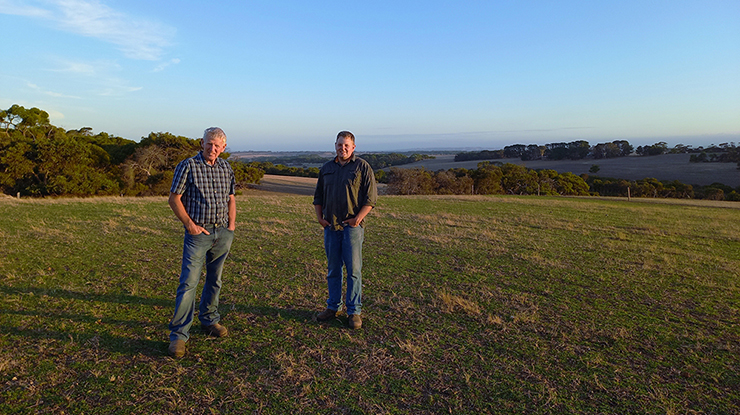 Jonny Bell and Nathan Bell standing in one of the Kikuyu paddocks which is being grazed.
Jonny Bell and Nathan Bell standing in one of the Kikuyu paddocks which is being grazed.
Access to independent agronomy advice on soils is crucial in making sound decisions according to Kangaroo Island farmer Nathan Bell.
“When we make decisions which are fundamental to our grazing business it is important to deal with people who know what they are talking about and aren’t trying to sell you something,” Nathan said.
“Being part of the local Meat and Livestock Australia’s Health Soils Group, run by Lyn Dohle of PIRSA, gave us access to the independent information we needed to learn more about our soils and pastures and how we can increase farm productivity.
“It’s great if you can run your own trials and see what neighbours are doing to quantify what is going to give you the best bang for your buck.”
Nathan and Chelsea Bell farm in conjunction with Nathan’s parents Jonny and Rosalie across several owned and leased blocks which contain a mix of pasture and scrub.
Jonny and Rosalie have two blocks covering more than 1,400ha (3,500ac), while Nathan and Chelsea have two blocks totalling 80ha (200ac) and 525ha (1,300ac) in lease blocks run collectively between both generations.
All the blocks are within 15 minutes of each other but are made up of very diverse topography, soil types and pastures.
“In one 24ha (60ac) paddock we have four different soil types which creates some challenges,” Nathan said.
The farm business operates an 18–19-micron self replacing Merino flock and produces first cross lambs.
The Merino enterprise is made up of 3,000 Merino ewes joined to Merino rams and a small flock of Merino wethers. Approximately 2,500 cull Merino ewes are joined to White Suffolk rams to produce first cross lambs and a small cropping operation is run to produce sheep feed.
“In the past we never really focused on the variation in our pastures and soils, although Dad had put out single super and trace elements, as well as applying lime sand for 20 years so the farm has a good fertiliser history,” Nathan said.
“As we have incorporated new blocks into the farm business the priorities have been removing rocks and stumps and getting fencing done. In more recent years the focus was on sheep genetics.
“When I came back to the farm in 2013 after working in the building industry, I was interested in understanding our soils and ways we could increase our pasture production.
“When the opportunity came up to get involved in the MLA Healthy Soil group run by Lyn Dohle, I jumped at it because it gave me the opportunity to get a better understanding of what we could do with our soil and pasture types.
“One of the valuable exercises was learning to understand indicators in pastures, that is learning to identify symptoms and then understanding the causes.”
Improving his understanding of soil chemistry was also a valuable part of the group activities, Nathan said.
“I’d never appreciated just how important a role calcium has in our soils – we have been spreading lime sand in the past and the Healthy Soils Group reinforced we were doing the right thing.
“While addressing soil acidity is one thing, there were also other benefits we didn’t appreciate such as the lime increasing the availability of calcium, sulphur and magnesium, all of which play a role in improving sub-clover vigour and reducing the impacts of red legged earth mite.
“Calcium also plays a crucial role in soil structure resulting in improved root penetration and soil moisture.”
Nathan said the group planned to trial using different rates of lime sand incorporated before pasture sowing, and as surface applications on established pasture, but the trials were shelved when the Kangaroo Island fires hit and people’s priorities became fencing, water and feeding stock.
“We have done some incorporation of lime sand when we renovated pastures in autumn 2020,” he said.
“We had a pH of 4.8 which was borderline for lucerne but 12 months later after incorporating 2.5t/ha of lime sand in the top 50-75mm, the pH is 5.5 and we were able to sow lucerne which is something we haven’t done before.
“We have a real challenge in hot dry summers with perennial pastures persisting which is why we want to try perennials such as lucerne and kikuyu which can respond to summer rainfall and handle the summer conditions.
“It is early days, but the ability of perennials to take the pressure off our annual pastures and provide quality feed for our young sheep over summer is really promising.
“One of the challenges will be getting lucerne to persist so we need to keep an eye on the soil pH and the risk of waterlogging.”
Nathan said his involvement in the Healthy Soils Group had highlighted the importance of farmers having access to independent agronomy advice from people such as Lyn Dohle.
“Each farm is different in term of the soils, pasture, conditions and challenges. There is a lot of value in running local trials to quantify what is going to work best for your situation,” he said.






